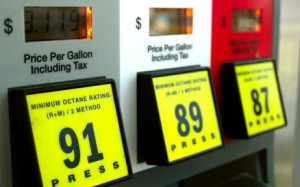
Ever meet someone who you have to step back from because they are glowing with energy, competence and presence? Rare, but memorable when it occurs.
Octane ratings for gasoline, invented by American chemist Russell Marker in 1926, is a complex calculation involving measuring various chemicals and their interaction and impact on “anti-knocking” in engines. Around the world, the octane in gasoline for automobiles is measured in various grades; the most popular in the US being “Regular”, “Mid-Grade” and “Premium”. Higher octane ratings correlate to higher activation energies–the amount of energy necessary to start a chemical reaction.
Leaders and managers associate with people in each of these fuel grades. While you may think that most would be tagged as Regular, the reality is the majority of people are in the Mid-Grade range. Common characteristics of this group are that they provide some energy, when they are engaged in something they enjoy doing. They spark when they have direction or are given incentives to do what they should be doing. About 80% of the work force would fit into this grade, and 80% of what they do could be done by another Mid-Grade person. In some respects, there is no point of differentiation in this category. Not enough performance to fuel a high-powered organization and higher cost than a Standard person, but not sure what you get for the extra cost.
About 10% of the work force would be considered Regular grade. They are affordable, abundantly available and never require a premium. You can’t use these folks in high risk, or high energy projects and you can’t hire them into highly complex organizations, as they will produce engine knock. They fit into ordinary situations.
About 10% of those remaining are in the Premium category, with the highest grade of Octane. These are the players; their compensation carries a premium, they are complex in chemical, or should I say, DNA structure. They run at a higher compression ratio without causing detonation. They deliver more output and they are the ones highly successful organizations seek.
Octane ratings for gasoline, invented by American chemist Russell Marker in 1926, is a complex calculation involving measuring various chemicals and their interaction and impact on “anti-knocking” in engines. Around the world, the octane in gasoline for automobiles is measured in various grades; the most popular in the US being “Regular”, “Mid-Grade” and “Premium”. Higher octane ratings correlate to higher activation energies–the amount of energy necessary to start a chemical reaction.
Leaders and managers associate with people in each of these fuel grades. While you may think that most would be tagged as Regular, the reality is the majority of people are in the Mid-Grade range. Common characteristics of this group are that they provide some energy, when they are engaged in something they enjoy doing. They spark when they have direction or are given incentives to do what they should be doing. About 80% of the work force would fit into this grade, and 80% of what they do could be done by another Mid-Grade person. In some respects, there is no point of differentiation in this category. Not enough performance to fuel a high-powered organization and higher cost than a Standard person, but not sure what you get for the extra cost.
About 10% of the work force would be considered Regular grade. They are affordable, abundantly available and never require a premium. You can’t use these folks in high risk, or high energy projects and you can’t hire them into highly complex organizations, as they will produce engine knock. They fit into ordinary situations.
About 10% of those remaining are in the Premium category, with the highest grade of Octane. These are the players; their compensation carries a premium, they are complex in chemical, or should I say, DNA structure. They run at a higher compression ratio without causing detonation. They deliver more output and they are the ones highly successful organizations seek.
- Measure your octane. Do an honest assessment of your own grade, and then put into place a plan to move up a grade. If you are already a Premium, develop a plan to become supercharged.
- Strengthen your grade. Hardly anyone is buying Mid-Grade fuel. Some stations have done away with it all together. If you are stuck in this grade, build your brand by increasing your skills and move up to Premium class….what are people willing to pay for you?
- Ignite your energy. Surround yourself with high Octane performers in an environment where everyone’s energy drives high performance. Be an octane booster for your organization and get others to continuously improve whatever they are doing.

 RSS Feed
RSS Feed